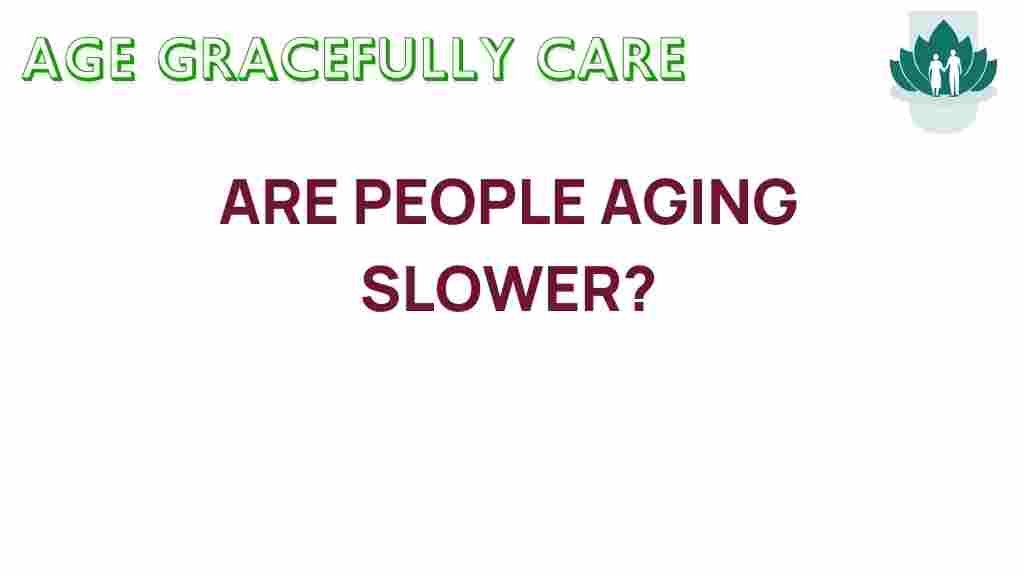Are People Aging Slower? Unraveling the Secrets of Youthful Longevity
In recent years, the question of whether people are aging slower has gained significant attention among researchers and health enthusiasts alike. With advancements in science, a better understanding of our biological clock, and a focus on lifestyle choices, the pursuit of longevity and health has become a prominent topic. This article explores the intricate relationship between aging, longevity, and wellness, while delving into the factors that influence our lifespan.
Understanding Aging and Longevity
Aging is a natural process that every living organism undergoes. However, the rate at which we age can vary significantly among individuals. Longevity refers to living a long and healthy life, where one maintains their vitality and well-being well into their later years. The quest for youth and longevity involves a combination of genetics, lifestyle choices, and environmental factors.
The Biological Clock: A Key Player in Aging
The biological clock is an essential concept in understanding how we age. It refers to the internal mechanisms that regulate the timing of various biological processes. This clock affects everything from cell regeneration to hormonal changes. Researchers have identified several key factors that influence our biological clock:
- Genetics: Our genetic makeup plays a crucial role in determining how quickly we age. Certain genes are associated with longevity and can influence our susceptibility to age-related diseases.
- Cellular Senescence: As we age, some cells lose their ability to divide and function properly, leading to a decline in overall health.
- Telomeres: These protective caps at the ends of chromosomes shorten with each cell division, and their length is associated with aging and lifespan.
How Lifestyle Choices Impact Aging and Longevity
While genetics undoubtedly plays a significant role in aging, lifestyle choices can greatly influence our health and longevity. Here are some essential lifestyle factors that contribute to a longer, healthier life:
- Nutrition: A balanced diet rich in antioxidants, vitamins, and minerals can combat oxidative stress and inflammation, which are linked to aging.
- Physical Activity: Regular exercise promotes cardiovascular health, maintains muscle mass, and enhances mental well-being.
- Sleep Hygiene: Quality sleep is essential for cellular repair and overall health. Poor sleep patterns can accelerate aging.
- Stress Management: Chronic stress can have detrimental effects on the body. Practices such as meditation, yoga, and deep breathing can improve mental wellness.
Research Insights: What Studies Reveal About Aging
Scientific research continues to uncover fascinating insights into the aging process. Some key findings include:
- Caloric Restriction: Studies suggest that caloric restriction can extend lifespan in various species by enhancing metabolic health.
- Blue Zones: Research on Blue Zones, regions with high concentrations of centenarians, highlights the importance of community, diet, and lifestyle in promoting longevity.
- Genetic Studies: Investigations into the genes of long-lived individuals provide clues about the biological mechanisms that contribute to aging.
Step-by-Step Process to Enhance Longevity
If you’re looking to enhance your longevity and improve your health, consider following these steps:
- Assess Your Diet: Evaluate your current eating habits. Incorporate more whole foods, fruits, and vegetables into your meals.
- Establish a Fitness Routine: Aim for at least 150 minutes of moderate aerobic activity each week, alongside strength training exercises.
- Prioritize Sleep: Develop a consistent sleep schedule and create a restful environment to facilitate quality sleep.
- Manage Stress: Incorporate relaxation techniques into your daily routine to help manage stress levels.
- Stay Socially Connected: Engage with friends and family, as social interaction is vital for mental and emotional well-being.
Troubleshooting Tips for Longevity
While the journey towards health and longevity can be rewarding, it may also present challenges. Here are some troubleshooting tips:
- Overcoming Dietary Cravings: If you struggle with cravings for unhealthy foods, try to replace them with healthier alternatives. For example, snack on fruits instead of sugary treats.
- Staying Motivated to Exercise: Find an exercise buddy or join a class to keep you motivated and accountable.
- Dealing with Sleep Issues: If you have trouble sleeping, consider reducing screen time before bed and establishing a calming bedtime routine.
- Managing Stress Effectively: Explore different stress-relief techniques to find what works best for you, whether it’s journaling, exercise, or mindfulness practices.
The Role of Genetics in Aging
Genetics is a significant factor in determining our potential lifespan and how we age. Studies have shown that certain genetic variations can increase the likelihood of living longer and healthier lives. Some crucial aspects of genetics in aging include:
- Longevity Genes: Specific genes, such as those involved in inflammation and metabolism, have been linked to longer lifespans.
- Epigenetics: Environmental factors can influence gene expression, meaning that lifestyle choices can modify how our genes affect aging.
- Family History: Understanding your family’s health history can provide insights into your potential health risks and longevity.
Conclusion: Embracing a Lifestyle for Youthful Longevity
In conclusion, while we cannot entirely control the aging process, we can certainly influence it through our choices and lifestyle. By understanding the factors that contribute to longevity, such as genetics, nutrition, physical activity, and stress management, we can take proactive steps towards a healthier and longer life. Aging might be inevitable, but with the right approach, we can make the most of our years and enjoy the benefits of youthful longevity.
To explore more about lifestyle changes that promote wellness, check out this resource. And for the latest research on aging and health, visit this site.
This article is in the category Health and created by AgeGracefullyCare Team

1 thought on “Are People Aging Slower? Unraveling the Secrets of Youthful Longevity”